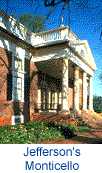When Monticello had a mezuzah
(How an American-Jewish patriot saved Thomas Jefferson's architectural masterpiece)
By Herb Geduld
PERCHED MAJESTICALLY on a small hillside in Virginia overlooking
Nowhere in Monticello itself is there any sign or plaque mentioning
this, nor is it acknowledged by the docents who escort you through the
home. Only at the end of the guidebook available at the site is there a
small but significant paragraph which acknowledges Levy's efforts:
"Without the efforts of this family (the Levys) which actually owned the
house for 89 years -- a far longer period than did Jefferson --
Monticello might not be today on the top of its 'little mountain.'"
Commodore Uriah Phillips Levy, the man who saved Monticello, was
America's first high-ranking Jewish naval officer and certainly one of
the most fascinating and flamboyant characters in Jewish American
history. He was born in Philadelphia in 1792, a grandson of Jonas
Phillips, a soldier in the Revolutionary War. At the age of ten, Levy
ran off to sea and spent his entire life in the Navy, eventually rising
to the top rank of Commodore.
Levy's career was a checkered one. His progress in the Navy was often
blocked by blatant antisemitism, which he fought vigorously both in
duels and courts-martial. He is best remembered today for his
successful campaign to abolish flogging in the U.S. Navy.
Levy was an ardent admirer of Thomas Jefferson. He considered him one of
the greatest Americans, especially because of Jefferson's ideals and
actions on behalf of religious freedom. Jefferson, a soft touch for
penniless relatives, died insolvent on July 4, 1826, 50 years to
the day of the adoption of the Declaration of Independence, which he had
authored.
Jefferson's family struggled to maintain Monticello -- going so far as
to hold what must have been one of the greatest house sales in American
history -- but they were unsuccessful. In 1831, the property was sold to
James Barclay, a Charlottesville apothecary, for $4,500.
The Barclays
did not enjoy living at Monticello because of the hordes of sightseers
and visitors who descended upon the home and sought desperately to sell
it.
A buyer was finally found when Commodore Levy, on shore leave in New
York, found out about the sale and immediately resolved to buy the
property of the man he so much admired. After some litigation concerning
the extent of the property, Levy purchased Monticello and the 218 acres
surrounding it in 1836 for $2,700. He restored the badly neglected home
to its former glory and spent his summers in it with his young wife.
In his will, written in 1858, he bequeathed Monticello to the people of
the United States or, if Congress refused to accept it, to the State of
Virginia, to be used as an agricultural school for the education of
orphaned children of U.S. Navy warrant officers.
Before Congress could respond, the Civil War broke out. Monticello was
confiscated and illegally sold by the Confederacy. After its restoration
at the end of the war, many of Levy's scattered heirs -- he died
childless -- successfully contested the will, a process which took many
years. It was not until 1881 that Uriah's nephew, named, appropriately
enough, Jefferson Monroe Levy, finally persuaded the other heirs to sell
him their shares of the estate, allowing him to move into Monticello.
The Civil War and the turmoil of litigation had taken its toll on the
property, which had been in the hands of an inept caretaker. Monticello
was a shambles. Jefferson Levy spent thousands of dollars and years of
effort to refurbish the property, including seeking out and repurchasing
Jefferson's original furnishings. By the turn of the century, Monticello
was almost restored to its original beauty. Levy, a bachelor who served
two terms in Congress as a representative from New York, spent his
summers at Monticello and opened the home to tourists.
Neither the Federal Government nor the State of Virginia showed any
inclination to acquire the property as a public trust.
In 1923, on
Jefferson's 180th birthday, a private, non-profit organization, the Thomas Jefferson
Memorial Foundation, was organized in New York. On December 23, 1923,
the Foundation purchased the property from the Levy family which had
preserved this priceless heritage for the nation.
TODAY, if a curious visitor walks a few steps along the road that passes
by the souvenir shop on the west side of the Monticello grounds, he will
come across a worn granite slab gravestone which reads:
 Charlottesville and the University of Virginia is one of America's most
important historical and architectural inheritances. It is Monticello,
the home of Thomas Jefferson. The fact that this national treasure
remains intact for American to view today is due to the little-known
efforts of a patriotic early Jewish-American hero, Commodore Uriah P.
Levy, and his family.
Charlottesville and the University of Virginia is one of America's most
important historical and architectural inheritances. It is Monticello,
the home of Thomas Jefferson. The fact that this national treasure
remains intact for American to view today is due to the little-known
efforts of a patriotic early Jewish-American hero, Commodore Uriah P.
Levy, and his family.
To the Memory of Rachel Phillips Levy
This slab, the only evidence of the Levys' long sojourn there, marks the
grave of Uriah Levy's mother, who died on a visit to her son's home. It
is not mentioned in any of the guidebooks or pamphlets on Monticello.
Born in New York 23 of May, 1769
Married 1787,
Died 7 of Iyar,
May 5591
A.D. 1839 at Monticello, Va.
Jewish historian and cultural maven Herb Geduld lives in Cleveland.
As of this issue, he becomes a regular contributor to JWR.